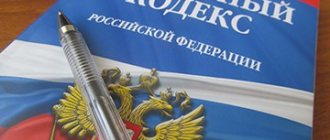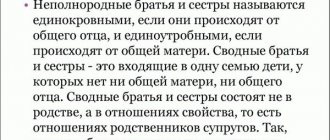Reasons for the emergence of family ties
A family relationship arises on the basis of:
- Consanguinity – based on biological descent from each other, which is confirmed by a birth certificate (children and parents, grandmothers and grandchildren, other relatives, where the relationship from one person to another can be traced).
- Court decisions – adoption of children. At the request of the adoptive parents, the court may decide to register the adoptive parents as the parents of the child they have adopted. Adopted children in relation to their adoptive parents and vice versa are equal in rights and responsibilities to relatives by origin.
- Remarriage is the relationship between children from previous marriages and the new spouse (stepson, stepdaughter and stepfather, stepmother).
The fact of a family connection must be documented in order to take advantage of the right or benefits established by legislative acts.
Confirmation or refutation of a close family relationship may be required:
- upon marriage;
- in the legal regulation of parental rights (deprivation or restriction);
- when paying taxes and state duties upon gift or inheritance;
- during employment, in cases of direct subordination or control.
Family ties: who is related to whom
Grandma, grandma
- mother of the father or mother, grandfather's wife
Brother
- son in relation to other children of the same parents
Godbrother
- son of the godfather Cross
brother, cross brother, named brother
- persons who exchanged pectoral crosses
Bro, brother
- cousin
Bratanich
- brother's nephew
Bratanikha
- cousin's wife
Bratanna
- brother's daughter, brother's niece
Bratelnitsa
- cousin or distant relative
Bratova
- brother's wife
Bratych
- brother's son, brother's nephew
Homogeneous (half-blooded)
- descended from the same father
Single-uterine (half-uterine)
- descended from the same mother
Father
- a man in relation to his children
Godfather
- the successor at the baptismal rite
Named father
- the father of the adopted child, the pupil
The father of the adopted, planted, mummer
- a man who replaces the groom's own father at the wedding
Stepfather
- a stepfather, another husband of the mother in relation to her children from previous marriage
Father
- the eldest in the generation
Father, stepfather
- son, heir
Please note => If stopped by a traffic police officer for no reason 2019
The concept of close relatives
Close relatives are persons between whom kinship arose on the basis of blood ties in an ascending and descending line.
In the ascending line these are children and parents, grandparents and grandchildren. In the descending line, full and half-siblings.
Despite the fact that there is no blood relationship between the adoptive parents and the adopted children, they are close relatives.
Husband and wife are not related. They are in a marriage relationship.
The relationship of the relatives of one spouse to the other and his relatives is a property of kinship. Relatives: father-in-law (mother-in-law) - father (mother) of the husband; father-in-law (mother-in-law) – father (mother) of the wife; son-in-law - husband of a daughter or sister; daughter-in-law (daughter-in-law) – son’s wife, etc.
Persons performing the functions of relatives, but legally are not:
- guardians and wards;
- citizens who are in a de facto marital relationship, but have not officially registered them.
Social kinship
Kinship through marriage is otherwise called the word “property” (from the word “one’s own”) or “social kinship.”
Such relatives are named as follows:
Spouses
- Spouses - married persons.
Husband (spouse) is a man in relation to the woman married to him.
- Wife (spouse) is a woman in relation to the man married to her.
Parents of spouses
- Father-in-law is the father of the husband.
- Mother-in-law is the husband's mother.
- Father-in-law is the wife's father.
- Mother-in-law is the mother of the wife.
- Matchmaker is the father of one of the spouses in relation to the parents of the other spouse.
- Matchmaker is the mother of one of the spouses in relation to the parents of the other spouse.
Brothers and sisters of spouses
- Brother-in-law is the husband's brother.
- Sister-in-law is the husband's sister.
- Brother-in-law - brother-in-law.
Shurich (obsolete) - son of brother-in-law.
Spouse of a close relative
- Son-in -law is the husband of a sister, daughter, or sister-in-law. In other words, a son-in-law is a man in relation to his wife's family: her parents. (father-in-law), her sister (sister-in-law), her brother (brother-in-law) and the latter’s wife.
- A daughter-in-law is a son's wife in relation to his parents. (father-in-law and mother-in-law). Really a daughter-in-law (due to unpleasant associations in the word “daughter-in-law”)
- Daughter-in-law - wife of a son, brother, brother-in-law. In other words, a daughter-in-law is a woman in relation to her husband’s family: his parents (father-in-law and mother-in-law), his brother (brother-in-law), his sister (sister-in-law) and the latter’s husband. The daughter-in-law for the father and mother of the husband is also the daughter-in-law for his entire family.
Yatrov (yatrovka) (obsolete) - brother’s wife.
Non-family relationships
In people's lives, close, non-family relationships are of great importance, which is also reflected in terminology.
Before marriage
- Groom - a man intending to get married, in relation to his future wife (bride).
- Bride is a woman intending to get married, in relation to her future husband (groom).
Wedding and marriage
- Imprisoned parents - persons replacing the parents of the bride or groom at the wedding.
A planted mother is a woman who replaces the natural mother of the bride or groom at a wedding.
- The planted father is a person who acts in place of the natural father of the bride or groom at a wedding.
Outside of marriage
- A cohabitant is a man who lives together with his partner and is in a close relationship with him/her without official registration.
- A cohabitant is a woman who lives together with her partner and is in a close relationship with him/her without official registration.
- A lover is a man who is in a close relationship with his partner, which is not encouraged by the law or morality of a given society, community, or relatives.
- A mistress is a woman who is in a close relationship with her partner, which is not encouraged by the law or morality of a given society, community, or relatives.
Relationships during the second (and subsequent) marriage
- A half-brother is the son of a stepfather or stepmother from a previous marriage in relation to a child born in another marriage of his parent.
- A half-sister is the daughter of a stepfather or stepmother from a previous marriage.
- Stepfather is a man in relation to his wife’s child born in another marriage = mother’s husband.
- Stepmother is a woman in relation to her husband’s child born in another marriage = father’s wife.
- Stepson - a boy in relation to the partner of his parent in another marriage = step-son of the husband or wife.
- Stepdaughter - a girl in relation to her parent's partner in another marriage = stepdaughter of her husband or wife.
Relationships upon adoption or loss of parents
- Adopted - adopted child.
An adopted daughter (named daughter, adopted) is a female person in relation to the adoptive parents.
- An adopted son (named son, adopted) is a male person in relation to the adoptive parents (adoptive parents).
Religious connections
- A godfather is a man in relation to the one he baptized.
- A godmother is a woman in relation to the one whom she baptized.
- Godson (godson) is a male person in relation to those who baptized him.
- Goddaughter (goddaughter) is a female person in relation to those who baptized her.
- Godfather is the godfather in relation to the godson's parents and godmother.
- Kuma is the godmother to the godson's parents and to the godfather.
- Godfather is the father of the godfather.
- Godbrother is the son of the godfather.
- Cross brother (brother on the cross, named brother, brother) - persons who exchanged crosses.
- Father - priest, as well as an appeal to him.
Father is an Orthodox priest, as well as an appeal to him.
- Matushka is the wife of an Orthodox priest or nun, as well as an address to her.
Biological connections
- Donor is a person who gives his or her blood, tissue, cells or organ for transplantation into other people.
- Recipient - a person who receives a transplant of any organ, tissue or cells of another organism.
Simera is an organism with an established graft.
- A foster brother is a boy/male in relation to a person with whom he was breastfed by the same woman, but who is not a sister or brother.
Alphabetical list of relationships
Grandmother, grandmother - the mother of a father or mother, the wife of a grandfather Brother - a son in relation to other children of the same parents Godbrother - the son of a godfather Cross brother, cross brother, named brother - persons who exchanged pectoral crosses Bro, brother - cousin Bratanich - brother's nephew Bratanikha - cousin's wife Bratanna - brother's daughter, brother's niece Brother - cousin or distant relative Bratova - brother's wife Bratych - brother's son, brother's nephew
Widow - a woman who did not enter into a second marriage after the death of her husband Widower - a man who did not enter into a second marriage after the death of his wife Great Aunt - the sister of a grandfather or grandmother (great aunt) Great Uncle - the brother of a grandfather or grandmother Branch - line of kinship Grandson - a son's son or daughters, sons of a nephew or niece Great-great-cousin - the granddaughter of a cousin Great-niece - the granddaughter of a brother or sister (second cousin) Great-grand-great - being a relative in the third degree, second cousin Great-siblings - second cousins Great-great-cousin - grandson of a cousin Great-nephew - grandson of a brother or sister Great-second cousin - grandson of a second cousin (second cousin) Granddaughter, grandson - daughter of a son or daughter, nephew or niece
Great aunt - the sister of a grandmother or grandfather Great great aunt - the sister of a great-grandmother or great-grandfather Great-great-great aunt - the sister of a great-great-grandmother or great-great-grandfather Great niece - the daughter of a cousin Brother or sister Cousin - the daughter of an uncle or aunt Great aunt - a cousin of a father or mother Great cousin - related to Second Degree Cousin - the son of an uncle or aunt Great Uncle - the brother of a grandfather or grandmother Great Uncle - a cousin of a father or mother Great Nephew - the son of a cousin Brother or Sister Great Great Grandfather - the brother of a great grandfather or great grandmother Great Great Grandfather - the brother of a great great grandfather or great grandmother Brother in law - the brother of a husband Grandfather, grandfather - the father of the father or mother Godfather - the father of the godfather Dedina, grandfather - aunt by uncle Dedich - direct heir by grandfather Daughter - a female person in relation to her parents Named daughter - adopted child, pupil Dsherich - nephew by aunt Dchersha - aunt's niece Uncle - a person caring for a child Uncle - father's or mother's brother, as well as the aunt's husband
Half-blooded children (same-blooded) - children born from the same father (consanguineous father), but different mothers) Half-uterine children (one-uterine) - children born from the same mother, but from different fathers Half-born - born from the same mother, but from a different father
Wife - a woman in relation to the man with whom she is married Groom, wife - unmarried fourth wife Groom - who has arranged a bride for himself
Sister-in-law, sister-in-law, sister-in-law - husband’s sister, sometimes brother’s wife Son-in-law - husband of a daughter, sister
Knee - branching of the clan, generation in the pedigree Godmother - participant in the baptism ceremony in the role of spiritual mother Godson - godson Goddaughter - goddaughter Godfather - participant in the baptism ceremony in the role of spiritual father Consanguinity - descent from the same parents Blood - about kinship within one families Cousin - cousin Cousin - cousin Kum - godfather in relation to the godson's parents and godmother Kuma - godmother in relation to the godson's parents and godfather
Little aunt - the sister of the father or mother (cousin) Little uncle - the brother of the father or mother Mother - a woman in relation to her children Godmother, godmother - successor during the baptismal rite Named mother - mother of the adopted child, pupil Milk mother - mother, nurse Mother planted - a woman who replaces the groom's own mother at a wedding Stepmother - a stepmother, the father's other wife in relation to his children from a previous marriage Foster sister - a child (woman) fed by someone else's mother in relation to her children Foster brother - a child (man) fed another man's mother in relation to her children. Husband is a man in relation to the woman he is married to.
Daughter-in-law - a brother's wife or a son's wife, as well as the wife of one brother in relation to the wife of another brother Illegitimate - born from parents who are not in a church marriage
Homogeneous (consanguineous) - originating from one father Monouterine (one-uterine) - originating from the same mother Father - a man in relation to his children Godfather - the successor during the baptismal rite Named father - the father of the adopted child, the pupil The father of the adopted, planted, mummer - a man who replaces at the wedding of the groom's own father Stepfather - stepfather, the mother's other husband in relation to her children from a previous marriage Father - the eldest in the generation Father, stepfather - son, heir
Stepdaughter - stepdaughter of one of the spouses Nephew - son of a brother or sister Niece - daughter of a brother or sister Nephew - relative, relative, fellow countryman Side (son, daughter) - son or daughter not descended from a legal marriage Generation - relatives of the same degree of kinship in relation to a common ancestor Fullbred - descended from the same parents Descendant - a person descended by birth from some clan, a person in relation to his ancestors Great-grandmother - the mother of a grandfather or grandmother Great-grandmother - the same as a great-grandmother Great-grandson - the son of a grandson or granddaughter Great-great-great-cousin niece - the great-granddaughter of a cousin Great-great-great-niece - the great-granddaughter of a brother or sister Great-great-great-great-great-second cousin - the great-granddaughter of a second cousin Great-great-great-great-great-grandnephew - the great-grandson of a cousin Great-great-nephew - the great-grandson of a brother or sister Great-great-great-great-great-great-great-grandson of a second cousin Great-grandnephew - daughter of a grandson or granddaughter Great-grandfather - the father of a grandfather or grandmother Great-great-grandmother - the mother of a great-grandfather or great-grandmother Great-great-grandson - the son of a great-grandson or great-granddaughter Great-great-great-great-great-great-great-great-great-great-granddaughter of a cousin Great-great-great-great-niece - the great-great-granddaughter of a brother or sister Great-great-great-great-great-great-great-great-great-great-great-great-great-great-great-great-great-great-great-great-great-great-great-great-great-great-great-great-great-great-great-great-great-great-great-great-great-great-great-great-great-great-great-great-great-great-great-great-granddaughter - great-great-great-grandson of a cousin Great-great-great-nephew - great-great-great-grandson of a brother or sister Great-great-great-great-great-great-great-great-great-great-great-great-grandson of a second cousin Great-great-granddaughter - daughter of a great-grandson or great-granddaughter Great-great-grandfather - father of a great-grandfather or great-grandmother Grandparents - the first known couple in the pedigree from which the clan originates Grandfather - parent great-great-grandfather, great-great-grandmother Ancestor - an ancient predecessor in the family, as well as a compatriot from previous generations Married - descended from the same parents, but born before marriage, and then recognized in it Adopted daughter - an adopted child of someone else, a girl Adopted son - an adopted child of someone else, a boy Fifth cousin - being a relative in the fifth generation (by great-great-grandfather)
Clan - a number of generations descending from one ancestor, as well as a generation in general Parents - father and mother in relation to children Parent - the same as the father Parent - the same as the mother Native - descended from the same parents See blood, full-blooded Relatives - relatives Ancestor - the first known representative of the clan from which it originates Pedigree - the same as genealogy Pedigree - a list of generations of the same clan, establishing the origin and degree of relationship Relative - one who is related to someone Kinship - a relationship between people created by the presence of common immediate relatives
Matchmaker (m), matchmaker (f) - the parent of one of the spouses in relation to the parents of the other spouse Father-in-law - the father of the husband Mother-in-law - the mother of the husband Step-brothers and sisters descended from different parents Step-children - children who are each other's brothers or sisters stepfather or stepmother In-law - a person who is related to someone Property - a relationship of closeness between people that arises not by kinship, but from a marriage union (relationships between a spouse and blood relatives of the other spouse, as well as between relatives of spouses) Brother-in-law - husband sisters-in-law (sisters of the wife) Brothers-in-law - persons married to two sisters Sister-in-law - sister of the wife Seventh cousin - being a relative in the seventh generation (by great-great-great-great-grandfather) Family - a group of relatives living together Sister - the daughter of the same parents or one of them in relation to their other children Sis, sister, sister - cousin Sister - cousin, daughter of a mother's or father's sister Sister, sister, sister (ancient Russian) - mother's sister's son (sisterly nephew) Orphan - a child or minor who has lost one or both parents Daughter-in-law - a son's wife in relation to his parents, daughter-in-law Consort - a brother-in-law's wife, the wives of two brothers in relation to each other Spouse - husband Spouse - wife Son - a man, a boy in relation to his parents Son godfather (godson) - a male person in relation to the adoptive son named - adopted, pupil
Father-in-law - the father of the wife Aunt, aunt - the sister of the father or mother, as well as the wife of the uncle Mother-in-law - the mother of the wife Second cousin - the cousin of the grandfather or grandmother Second cousin - the daughter of the second cousin or sister Second great-great-grandmother - the cousin of the great-grandfather or great-grandmother Second cousin - great-great-grandmother great-great-grandfather or great-grandmother Second cousin - the daughter of a great-uncle (aunt) Second cousin - a second cousin of a father or mother Second cousin - who is a relative in the third degree (through a great-grandfather) (see great-grandfather) Second cousin - the son of a great uncle (aunt) Second cousin - a cousin grandfather or grandmother Second cousin - a second cousin of a father or mother Second cousin - a son of a second cousin Second cousin - a cousin of a great-grandfather or great-grandmother Second cousin - a cousin of a great-great-grandfather or great-great-grandmother Adopted - a female person in relation to his adoptive parents Adopted - a male person in relation to adoptive parents
Last name is the same as clan, family
Fourth cousin - second cousin of a grandfather or grandmother Fourth cousin - daughter of a fourth cousin Fourth great-grandmother - second cousin of a great-grandfather or great-grandmother Fourth great-great-grandmother - second cousin of a great-great-grandfather or great-grandmother Fourth cousin - daughter of a second cousin Uncle (aunt) Fourth cousin - four father's or mother's cousin - a relative in the fourth generation through a great-grandfather Fourth cousin - the son of a second cousin of an uncle (aunt) Fourth cousin - a second cousin of a grandfather or grandmother Fourth cousin - a fourth cousin of a father or mother Fourth cousin - the son of a fourth cousin Fourth great-grandfather - a second cousin of a great-grandfather or great-grandmother Fourth cousin great-great-grandfather - second cousin of great-great-grandfather
Sixth cousin - being a relative in the sixth generation (by great-great-great-great-grandfather) Brother-in-law - wife's brother Shurich - son of a brother-in-law (wife's brother)
Yatrov (yatrovka) - wife of brother-in-law (husband’s brother)
In preparing the article, materials were used from the sites: ru.wikipedia.org, wikiznanie.ru
The article was written and posted on October 28, 2012. Added -
ATTENTION!
Copying the article without providing a direct link is prohibited. Changes to the article are possible only with the permission of the author.
Author: lawyer and tax consultant Alexander Shmelev © 2001 — 2020
Who is a close relative under the law?
The law does not establish a single meaning for the concept of “close relatives”, therefore different rules of law give their own characteristics to “close relatives”.
Family Code of the Russian Federation
Family ties are the most important in family law. Most personal and property relations are based on facts of kinship.
Article 14 of the RF IC identifies the following citizens as close relatives:
- parents and children;
- grandfather grandmother;
- grandchildren;
- full and half brothers and sisters.
Persons who are related are not allowed to marry.
Adopted children, adoptive parents and their relatives are equal to relatives by origin (Article 137 of the RF IC)
Civil Code of the Russian Federation
Important categories of legal relations in civil law are donation and inheritance, in which close relatives have advantages over others.
Chapter 63 of the Civil Code of the Russian Federation, Articles 1142 – 1145 and 1148, provides for inheritance by law in order of priority. The parents, spouse and children of the testator are the first-degree heirs. The heirs of the second stage according to the law are full and half brothers and sisters, grandparents of the testator. Close relatives are called upon first to inherit. In the absence of these heirs, the right to inherit by law is given to the relatives of the testator of the third, fourth and fifth degrees of kinship.
Read more about the order of inheritance by law in the article: Inheritance by law: order of inheritance (scheme)
Tax Code of the Russian Federation
When making a gift, close relatives are exempt from paying tax on income received as a gift.
How to determine the degree of relationship
If the deceased and his family had people who lived with them under the same roof for at least five years, it makes sense to talk about the fourth stage. Confirming the fact of long-term residence with the family of the deceased can only be done by registering at a single address. There are often cases when such registration is missing. The only way for a potential heir in such a situation is court. The very last, fifth stage consists of relatives up to the sixth degree. When determining the degree of relationship and considering family ties in the tables, you need to know that the closest relatives are the father, mother and their natural children (sons and daughters). If brothers and sisters have the same mother and father, then there is a blood relationship between them. Not only are these people considered the closest. They often have common characteristic features, not to mention external similarities. Such people often choose the same (or related) professions. Unconsciously copy each other in behavior and life principles.
Which relatives are considered close
Husband and wife
A husband and wife are not considered close relatives because they are not related by blood. When entering into a marriage relationship, spouses are endowed with mutual rights and obligations for mutual material support (Clause 1 of Article 89 of the RF IC). The following have the right to demand maintenance:
- disabled needy spouse;
- wife during pregnancy and for three years from the date of birth of a common child;
- a needy spouse caring for a common disabled child until the child reaches the age of eighteen or a common child who has been disabled since childhood, group I.
After the death of the husband, the wife is included in the circle of first-line heirs. In case of divorce, the spouse has the right to receive half of the property acquired during the marriage.
Full and half siblings
When inheriting by law, this category of persons belongs to the heirs of the second stage. If the heirs of the first stage are absent, have refused the inheritance or are recognized as unworthy, the heirs of the second stage are called upon to inherit. Half brothers and sisters have all the rights and responsibilities of full brothers and sisters.
Full and half-siblings (having a common father or mother) brothers and sisters (clause 18.1 of article 217 of the Tax Code of the Russian Federation; article 2, paragraph 3 of article 14 of the RF IC) are exempt from paying personal income tax when receiving any gift. For the issuance of a certificate of the right to inheritance by law and by will, they pay less state duty than other categories of heirs.
Cousins
During inheritance, cousins are considered relatives of the testator, but inherit by right of representation in the event of the death of their parents.
Grandmother and grandfather
Grandparents are close relatives to their children and grandchildren and are second-degree heirs.
Stepfather, stepmother and stepson, stepdaughter
This category is not related by blood and legal rights between them arise upon entering into inheritance. They are heirs of the seventh order and are called upon to inherit if there are no heirs of previous orders.
Mother-in-law and father-in-law, mother-in-law and father-in-law
Mother-in-law, father-in-law, mother-in-law and father-in-law are close relatives with their children, but in relation to the husbands and wives of their children they are not. There are no mutual rights or obligations between them. If they live in the same apartment they become family members.
How to determine the degree of relationship
In family law, great importance is attached to consanguinity, which is the basis for the emergence of relations between parents and children. But only alimony obligations can arise between other close relatives. For example, the child is supported by the grandmother, since the parents are not able to make payments. Accordingly, the degree of kinship recognizes the connection through birth. That is why the count of degrees is determined by the number of births separating one relative from another. For example, there is 1 birth between father and son, respectively, 1st degree of relationship .
02 Jan 2021 marketur 301
Share this post
- Related Posts
- How long can a 16 year old walk for a walk in the summer?
- How to register a deregistered car
- How to write a complaint to the school principal about a teacher who is not fulfilling his duties
- Calculate a mortgage in Sberbank calculator with maternity capital
Family ties during inheritance
The testator, at his own discretion, has the right:
- bequeath property to any persons;
- determine the shares of heirs;
- disinherit heirs by law without specifying reasons;
- revoke and change a will.
Article 1149 of the Civil Code of the Russian Federation establishes the right to an obligatory share in the inheritance for the following category of relatives and dependents:
- minor or disabled children of the testator;
- disabled spouse and parents;
- disabled dependents.
This category of relatives inherits, regardless of the contents of the will, at least half of the share that would be due to each of them if inherited by law.
The amount of state duty for performing notarial acts
The amount of the state duty for issuing a certificate of the right to inheritance by law and by will depends on the degree of relationship between the testator and the heirs (Article 333.24 of the Tax Code of the Russian Federation):
- children (natural and adopted), spouse, parents, full brothers and sisters pay 0.3 percent of the value of the inherited property, but not more than 100,000 rubles;
- other heirs pay 0.6 percent of the value of the inherited property, but not more than 1,000,000 rubles.
Documentary confirmation of the relationship with the testator is necessary.
Criminal procedural and criminal correctional legislation
It is already clearly stated here that close relatives include:
- spouse);
- father and mother;
- son and daughter;
- adoptive parents;
- adopted;
- brothers and sisters, and relatives;
- grandparents;
- grandchildren.
It is noteworthy that Article 51 of the Constitution of the Russian Federation refers to this concept of “close relatives”. It reads: “No one is obliged to testify against himself, his spouse and close relatives, whose circle is determined by federal law.” In this case, federal law means the Criminal Procedure Code of the Russian Federation.
The Code of Criminal Procedure of the Russian Federation separately stipulates the conduct of procedural actions with the participation of close people. For example:
- The interrogation of a minor is carried out only in the presence of his legal representative (parent).
- A citizen has the right not to testify against a relative in court and during investigative actions.
- Legal spouses, as well as blood relatives, have the right to visit their loved one in a correctional facility. While it is difficult for a cohabitant or another person to get a date.
Legislation on social insurance
Domestic legislation establishes the right to receive a funeral benefit if it was provided at the expense of a spouse or close relative.
To pay it, you must write a corresponding application and present it along with the death certificate:
- to the Russian Pension Fund, if the deceased received a pension there;
- employer;
- to the social security department, if the deceased was not insured by the Social Insurance Fund;
- to the Social Insurance Fund, for example, in the event of the death of a minor.
In addition, some employers provide financial assistance in this case.
Housing legislation
The term in question is completely absent in housing law. At the same time, the concept of “family member” is widely used. It is family members who are subject to rights and responsibilities under housing legislation. These include:
- spouse),
- children
- the owner's parents.
In this case, the owner has the right to move in (register) someone else as a family member. It turns out that a family member can be either a relative of the owner or a complete stranger .
Rubric “Question/Answer”
Good afternoon Is my stepfather a close relative if he was legally married to my mother for more than 30 years? Now he is dead. I work in a government agency. Can I receive financial assistance in connection with his death? The organization’s wage regulations state that financial assistance is paid in connection with the death of a close relative. Thank you!
If my brother and I have the same father, but different mothers, can we legally be considered close relatives?
My father, with whom my brother and I did not communicate, died. The mother has been dead for a long time. The father lived with another woman and left a will after his death. He bequeathed all his property to her. Can my brother and I get a share as close relatives?
Detailed answers about who is considered close relatives:
- Due to frequent changes in legislation, information sometimes becomes outdated faster than we can update it on the website.
- All cases are very individual and depend on many factors. Basic information does not guarantee a solution to your specific problems.
That's why FREE expert consultants work for you around the clock!
- via the form (below), or via online chat
- Call the hotline:
- Moscow and the Region
- St. Petersburg and region
Marriage
The wife is not a close relative of the husband. They are members of the family they created. The registry office will refuse to register a marriage for persons who are related, as well as for adoptive parents and adopted children.
However, the property and special legal regime of joint property are established between the spouses. Each of them claims to share property after a divorce. The spouse, among the children and parents, is ranked as the heir of the first priority by law. Spouses are equal parents for their families. In relation to spouses, issues of restriction or deprivation of parental rights and payment of child support are resolved.
Housing law provides for the right of one spouse to use the housing of the other for some time, subject to certain conditions.
After the divorce, the spouses are no longer family members and lose legal privileges.
What laws govern the concept?
Determining who is considered a close relative under the law, and who in a particular case is not, is determined by the specific law that regulates the relationship. The absence of an appropriate definition in this law does not mean that all relatives without exception belong to the category of close ones.
The most general characteristic of this concept is contained in the legislation regulating marriage and family relations (Family Code of the Russian Federation, we will write in more detail below). It is the persons listed in it who are recognized as close relatives.
However, the peculiarities of legal relations in a particular legal area also leave an imprint on the concept of close kinship, as a result of which the list of such relationships can be changed and presented with a broader list.
First of all, this concerns criminal legislation, as well as certain civil norms, therefore the relevant codes or individual laws in their general provisions contain a definition of relatives recognized as close when applying the special norms of such legislation.
Now let's focus on individuals
Sisters and brothers
As can be seen from the previous analysis, full and half-sisters and brothers are united by close kinship in the legal sense.
Half-brothers and sisters are not close relatives.
Grandmothers and grandfathers
They are recognized by law as close relatives. The grandmother is a close relative by law to the grandson in the same way as the grandfather. After all, there is a blood relationship between them. Therefore, grandchildren can claim the inheritance of their grandparents. In the absence of a will to transfer all property to a grandson, he can claim the right to it in order of priority after the death of his grandmother (grandfather).
Mother-in-law with father-in-law and father-in-law with mother-in-law
A mother-in-law with a father-in-law in relation to a son-in-law and a father-in-law with a mother-in-law in relation to a daughter-in-law are united by a relationship of property, but not kinship. At the same time, they can be considered family members.
Stepfather and stepmother
They will be close relatives of the child only if they adopt him. Otherwise, the law of kinship does not recognize them.
Aunts and uncles, nephews and nieces
These are not classified as close relatives by law. However, they are not prohibited from inheriting in third order.








